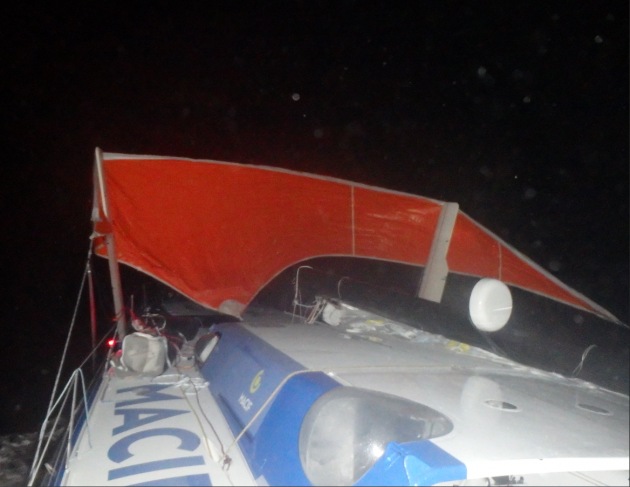Macif skipper Francois Gabart explains the circumstances surrounding a dismasting that ended their lead
Vendée Globe winner Francois Gabart sounded as objective and upbeat as he possibly could this morning when he described the dismasting of MACIF which happened around midnight last night whilst sailing in relatively normal trade winds conditions, some 140 miles from Salvador de Bahia, Brasil.
.
After being forced out of the Barcelona World Race in January 2011 when the top of their rig failed on Foncia when Gabart and Desjoyeaux were lying a close second, the empty feelings of deception and dejection are ones that the gilded duo know well, but Gabart was painting a brave face on things:
“We look to the positives, it could have happened at any other time and that would have been worse for us and for the boat. It’s been great since it happened in the Barcelona . There is no reason why it can’t follow on the same after this second dismasting.” Gabart told a live Radio Vacation with the French media assembled at the finish in Itajaí.
Gabart confirmed that MACIF has had a new mast since he won the Vendée Globe in Fabruary, striving to save a little weight.
The duo had around 1100 miles to race to the finish when their mast came down, having lead since November 17th. Vincent Riou and Jean Le Cam take over as leaders of the class, with 59 miles in hand over Marc Guillemot and Pascal Bidégorry on Safran who rose to second today, making up around 50 miles since yesterday.
Gabart recalled: ” We were sailing on port tack with the full mainsail and big gennaker in 15-20kts of wind with a little sea from behind us, which was allowing us to surf a little, it was not unpleasant. An hour or two before we had been having some gusts but the wind was quite stable when the mast broke. We were under pilot, I was in the cockpit and Michel (Desjoyeaux) was resting inside. I suspect that it was the tube which broke rather than something peripheral (rigging/outrigger etc). The mast broke a dozen or so metres above the deck and that meant about 18 metres of mast in the water. The standing part was supported by the coachroof. We turned downwind.
Fortunately we were all safe when it happened. It is certainly better not to be in the way of when the mast and sails come down. In about one hour we managed to separate the upper part of the mast from the lower section and to preserve the boom. We are both in the same state of mind, sad and disappointed. But we are two people who look forwards. And at these times it is certainly better to do that.”
Some ideas “As soon as it starts to break within two seconds everything is down, so really I can’t speculate as to what might have happened. I know we were pushing the boat but we were in conditions which seemed pretty normal. And this is not exactly the first time I have been pushing the boat since it was launched two years ago.
After the Vendée Globe we have set a new mast which is lighter. We wanted to save some weight without sacrificing reliability. If we still had the first mast maybe the same thing would have happened. But this second mast was always a bit more fragile in the harsh conditions of the Transat Jacques Vabre. I don’t want to second guess anything but it seems obvious.
I don’t think our match race with PRB had any impact on how we pushed the boat. We held back at times, our goal was to sail better consistently. We did not want to overdo it, we wanted to sail cleanly and even if PRB had been a few miles ahead, or behind, then nothing would have changed.”
Second time unlucky “I have had two dismastings in my life, both in IMOCAs between Brazil and Africa and both sailing two up with Michel. We think of the dismasting which happened two years ago in the Barcelona World Race. But the reasons are different. But there is the same feeling of sadness because all of a sudden everything just stops. At the same time we look to the positives, it could have happened at any other time and that would have been worse for us and for the boat. It’s been great since it happened in the Barcelona. There is no reason why it can’t follow on the same after this second dismasting.”
Heading to Salvador de Bahia
We are sailing downwind towards Bahia. We would not have done too well trying to get upwind in with the storm jib … We have some fuel but it is limited to get to Bahia. And we want to have enough fuel for when we get to port. Our work under storm jib is useful. The idea is to make the best possible course to sail. We are doing 3-4 knots under sail and under engine 6-7 knots . We might get the there tonight or tomorrow morning. The MACIF team is flying tonight to arrive tomorrow morning or later in the afternoon. In Salvador de Bahia we plan to set a better, more efficient jury rig to sail to Itajaí as the boat must leave by cargo ship in the next few weeks. “




